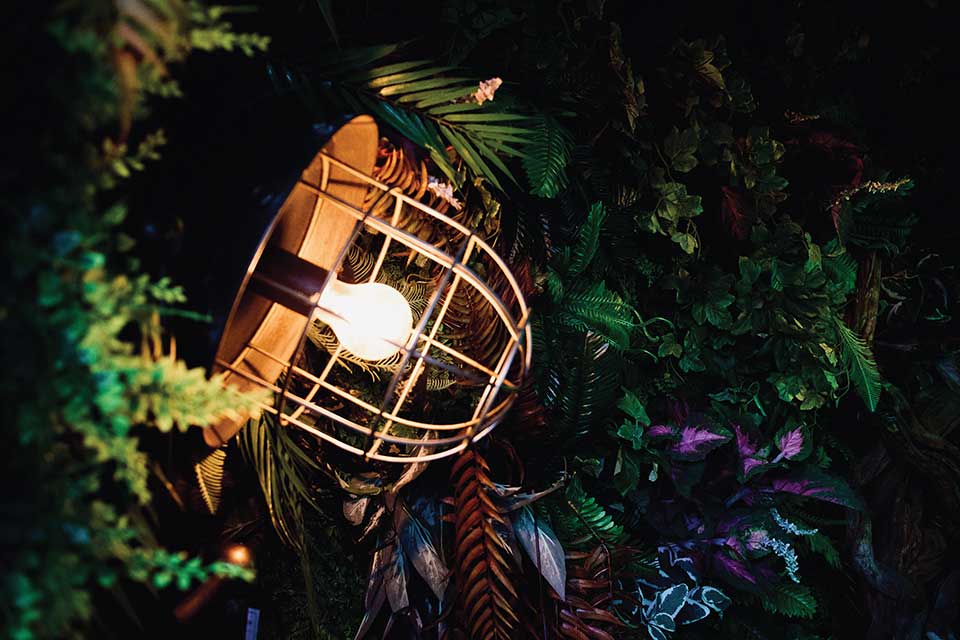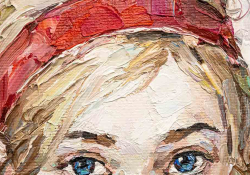Chlorophyll: A Reminiscence

With two weeks of food and the outside world covered in cellophane, apartment dwellers under a stay-at-home order get to know their neighbors as things grow increasingly more bizarre.
Ever since the stay-at-home order, Edward dreamed of visiting a botanical garden or at least a park. When he was still working, you couldn’t get him to the park for anything: in the evenings he wallowed, splayed out on the broken couch like a blob of mercury emitting dangerous fumes; on the weekends, he sorted through his clothes, started and finished endless TV shows.
Now he was constantly complaining: about the park, the garden, the cherry blossoms that we would miss this year. We missed the cherry blossoms every year because Edward had work, and now we’d miss them because we weren’t allowed to go out for some reason.
There was definitely something going on outside: Edward tried to leave the apartment but said that everything out there was covered in cellophane. At home we had enough food for two weeks—no more.
“We have to get to know the neighbors,” I said. “We don’t even know their names.”
“So what?” said Edward. “Whenever we see their packages downstairs, we see their names, we already know everything we need to know.”
It didn’t work out that way: although we saw all these names regularly, we didn’t remember them. Clearly, names became real only when people answered to them. All the others were empty tags: Damien Hernandez 3B, Parisa Vakhdatinya 2A, Miriam Monalisa Khomeini 1C, Joy Bang 3C, William Campbell 2C. Were these actually real, live people?
Names became real only when people answered to them.
“William Campbell is Paul McCartney’s doppelgänger,” I said. “When Paul McCartney was hit by a car in 1966, he was replaced by William Campbell. But we love old William, our steadfast hero, so much so that we can’t imagine he’s the replacement of some cheeky upstart from a working-class neighborhood! Good thing he bit the dust in sixty-six, right?”
Edward fumbled with the window frame, yanking it back and forth.
“These are all made-up names,” I said. “Joy Bang—is that a man or a woman? Damien Hernandez is a pretty average name. That could be a person of any race, appearance, or even gender. I couldn’t tell Miriam from Parisa for my life. They’re all just like mold on the walls, mere statistics.”
Edward leaned out of the window as far as he could, taking a long time to tear off the layer of cellophane. It was thick and gray, like a bad dream where you can’t move or talk. But there was another layer of cellophane, and about a meter away, in between the layers, a neighbor was walking his dog. Him, I knew.
“Wasn’t he the one with the dog who howled whenever its owner was out?” I asked.
“Now we’ll never know whose dog it was,” Edward replied. “Everyone’s at home and no one’s dog is howling.”
“If someone dies, their dog will start howling,” I said. “I’d like to think so, anyway.”
While washing the dishes after breakfast, I found some mold—ulcer-red, pink, alive—on the dish rack. I turned it over, coughed, and ran to the bathroom. I spent a long time bathing the slimy rack in boiling water as if it had come to life. Edward was working in the bedroom, and I decided not to bother him. I could hear the harsh sounds of a bad connection from the other room.
When I returned the rack to its spot, I noticed more mold below, black, by the legs of the sideboard. I crouched down to get a better look; at first glance it looked like a black bump of dirt that someone had scattered in a ritual act. But a closer look revealed some thin-barreled mushrooms climbing over each other like acrobatic ants with sprawling little hands and legs. The mushrooms were piled, heaped, stacked on top of one another, some forming pyramids. My careful sniff made clumps of the mushroom colony sway: a storm, I thought, they’re running around, getting their emergency getaway bags together, poor things.
The mold was hard to clean off. I just scraped at the top of it. The next day the clump had grown back and this time looked like pure black earth.
“Did you repot the plants or something?” Edward asked. He had changed back into house clothes. Up until now, he’d been shaving and putting on a suit and tie for conference calls, just like in normal life. I’d stopped shaving a long time ago.
He’d been shaving and putting on a suit and tie for conference calls, just like in normal life. I’d stopped shaving a long time ago.
“The gnats are gone,” he said thoughtfully, checking the plants, which, of course, I hadn’t repotted. The Zamioculcas zamiifolia, which everyone here calls a “ZZ plant,” had the crisp, muscular hands of a magician. As if flicking a fan of cards, it released flickering, silvery-black gnats. They took off with difficulty, sporadically, as if they were about to fly in mini-squadrons to attack a tiny little Poland located somewhere under the vanity.
“Last night a gnat like that bit me,” Edward said, as he rolled up his stretched-out, mysteriously greasy, sweaty pant leg. It turned my stomach.
“Look, it’s a classic fly bite: the top layer of the skin is eaten off. Gnats don’t bite like mosquitoes. They eat whatever they cut off with their little nail file. Even a little one can scrape a good bit off if you don’t catch it in time.”

The Zamioculcas zamiifolia had the crisp, muscular hands of a magician. As if flicking a fan of cards, it released flickering, silvery-black gnats.
Three days later, in a bowl that was more for decoration than for enclosing tea-faring sailors, I noticed a lemon covered in a gray-blue moldy fungus. I turned the lemon over in my hands. A gnat landed on it.
In the box where we kept fruits and vegetables, there was an embarrassed rustling, as if a shy schoolgirl was trying to wrap the cookies she’d made herself in wax paper, to make a neat little parcel.
“A mouse!” said Edward. “I told you!”
“No way there’s mice in there,” I said. “Maybe there’s a rotting piece of fruit that’s giving off gases. And those air currents are moving across the onions and rustling the onion skins. We need to report this to the super. They have to do something.”
“I had a friend,” said Edward. “She was around fifty. She was worried she might have Alzheimer’s. One day she woke up and saw a possum sitting in the middle of the room. You know possums are huge! First floor. There was a garden right outside her window, and he jumped in through there, through some sort of hole. It was an old building. She shooed him. He hissed and ran away. And the next night she wakes up, looks around, and there’s the possum, stomping around.”
“Then what?” I asked. “It bit her, and she got rabies?”
“No,” said Edward. “Possums don’t have rabies. They’re such ancient animals that they had completely developed before the virus even came into existence. They’re marsupials, with a low body temperature. So low that rabies can’t even survive in them—too cold.”
“The rabies freezes like an arctic explorer,” I said.
“She constantly complained to her super—hey, fix the holes, this possum comes every day and rummages through the laundry. No one believed her; they thought she was going crazy and said, ‘Maybe you have early-onset Alzheimer’s.’ Awful, right? And when she made a scene, you know what they gave her? A little mousetrap. The size of your palm.”
“Then what?”
“The possum didn’t come back. But she thinks they just plugged the hole from the garden.”
“All kinds of things come in from the garden,” I said. “Although now there’s cellophane everywhere, they probably can’t get past that.”
Edward washed his mug and stared at the blubbering drain hole.
“There are some gray, triangle-shaped flies circling around. Have you seen these before?” he asked.
“How many times do I have to tell you, don’t rinse off even the tiniest bit of food! We always get drain flies, even from potato peelings!” I said.
Another rustle from the onion stockpile.
“Why don’t I stick a knife in there?” I said. “An excuse to get to the bottom of this.”
“I have to work,” said Edward. “Can we do it tomorrow instead?”
I suggested we go down to the basement—maybe the neighbors had organized some recreational activities for people like us. The basement connected all the building’s entrances. There were several communal rooms, a laundry room, a bike stand, a boiler room, and some winding corridor spaces for storing shit.
The basement stirred with the sounds of a forest, but everything was decayed and useless.
Pushing aside yellow branches that rustled like our mouse, we got to the common room. 3B was standing there with a tennis racket under his arm like a shotgun. After a good look, I realized it was a shotgun.
3B was standing there with a tennis racket under his arm like a shotgun. After a good look, I realized it was a shotgun.
“There’s not enough chlorophyll,” said the neighbor, glancing at the yellow, botanical mess covering the ceiling: there were branches, ivy, and some sort of iridescent, ropy, hemostatic vines suspended like gallows above our heads.
He seemed to be apologizing for the poor quality of the forest.
“No sun, no chlorophyll. But they’re still climbing, you see.”
He kicked a withered, shaggy bush.
“We’re hunting, you boys can come. If you just came down to talk, though, better wait.”
3B and his partner moved slowly along the winding, rusty, jungle corridor toward the next entrance. 3B’s partner carefully parted the brush with a machete.
A small, round deer appeared from around the corridor corner. Its eyes were clouded, bleary, and dull.
“A deer! Great!” cried 3B. “Let’s go!”
From around the other corner, someone fired. It was 2A and 1C—they leapt out to meet us, guns smoking, trying not to touch the slow, yielding deer, letting out quivering teakettle steam from its nostrils.
The deer collapsed heavily, like a table, into the patchy brush.
“If you don’t kill them, they don’t send more,” said 3B. “Don’t even start. Everyone on our floor’s vegan. Just don’t start, okay? I can’t. I’m too fucking tired to explain again.”
“Where are these guys from?” asked 2A and 1C. “The second floor? Do they have guns?”
“Why did you kill it?” asked Edward.
“If you don’t kill them, they don’t send more,” said 2A. “We heard they didn’t kill them in the building next door. And what happened? That’s it, they didn’t send any more. They’re screwed over there. If you fumble a kill once, they’ll overlook it. The second time is still more or less fine, they’ll just delay the next shipment. After the third time, they won’t send any more.”
“There’s some fruit growing there you can eat,” I said, touching Edward on the shoulder.
“They’re no good,” said 1C as she leaned over the deer with a knife. “They either never get ripe, or they’re overripe and rotten. There’s not enough sun. At first, we also thought, ‘hey, fruit!’ Right, if you can call it that. Try it. There was a gooseberry branch by the third entrance, but man cannot live on gooseberries alone.”
Edward turned around and went upstairs.
After a while, I knocked on the bedroom that he’d converted into an office. Somehow Edward knew I’d brought a piece of meat with me.
“I’m not eating that,” he said from behind the closed door.
“Let me try to cook it!” I said. “Maybe you’ll like it. Did you hear what happened next door?”
“I’m not eating that,” Edward said testily.
I cut the meat into thin strips and sautéed them with olive oil, cream, garlic, onion, and other stuff. The deer tasted like beef, but more tender. It could’ve used some lemon juice, of course.
Edward came out of the bedroom in his robe and frowned at me.
“What are you going to eat?” I asked. “I know you’re not eating deer. But you can’t skip meals just because your regular food isn’t available—your precious vegetables. Or are you such a sissy that you’ll only eat gooseberries?”
“Chicken,” Edward said after a moment. “It’s not that good either, but I can learn to live with it.”
I’ll talk to the neighbors, I thought. For Edward, I’ll try to hunt down a chicken in this jungle.
A few days later, I went down to the basement. The yellow jungle was there, like before. 2A and 1C sat on the steps in khaki suits, like soldiers in Vietnam. 1C was smoking a hand-rolled cigarette.
“Careful,” I said. “All these plants are dry. The brush is dry. You could burn the whole building down.”
“She’s stressed out,” said 2A. “She killed a lamb yesterday. She’s upset. Couldn’t eat it.”
“I only killed it because our building’s been given a warning. You know, from when you couldn’t shoot that dog. Remember?”
“Shut up.”
“You’re from China!” 1C spat at her feet. “In China, you kill dogs every day without batting an eye! You boil them alive in cauldrons!”
“I’m not going to respond to that because I feel sorry for you,” said 2A.
I told them I’d like to shoot a chicken for Edward. They referred me to 2C, who truly looked like someone’s doppelgänger, or even a universal doppelgänger. Basically, he reminded me of everyone I’d like to forget.
“They don’t send chickens often,” said 2C. “They’re hard to divvy up, not much meat. Although it’s possible. Come to lunch tomorrow, there are rumors that some sort of bird is being sent. I’ll tell the group that, starting on the third, it’s your turn, since you haven’t hunted yet. You’ll save the legs and the wings for me and the others, alright?”
“Okay,” I said.
The next day, I grabbed a large kitchen knife and googled how to wring a chicken’s neck without putting it in pain. But how to catch it? Do you just shoot it?
The next day, I grabbed a large kitchen knife and googled how to wring a chicken’s neck without putting it in pain.
Below, in the basement, by the entrance to the jungle, 2C was already waiting for me in a green protective jacket and a mosquito net.
“Flies,” he explained. “Small and triangular. You’ve seen them! Like Phantom jets, hahaha. I’ve seen those things, clear as day!”
He thrust a rifle into my hands.
“Even if you get tangled in the vines, don’t think—just finish it off! And never look the victim in its eyes! Not even a bird’s. You won’t be able to kill it, and we’ll get a second warning!”
We went deeper into the brush. Corn husks slapped against my face, spilling out from under the wires that hung everywhere. We must have reached the electrical panel. Somewhere a tropical bird was screeching unpleasantly, and I could hear the gurgling of a stream.
“Stop,” whispered 2C. “Quiet! Stop, you bonehead!”
Around the corner from the laundry room, a small green duck with round eyes waddled nonchalantly toward us.
I stood and looked at the duck.
“Don’t even breathe,” whispered 2C. “Go!”
The duck waddled a few steps and froze. Apparently, it had noticed a spider on the cement wall, which was uncharacteristically showing through the crumbling russet cap of shaggy tropical ivy, twisted like a witch’s braid. The duck myopically poked its yellow beak into the damp cement. Its round eye reflected the electrical panel.
I breathed, aimed, and looked the duck in the eye. It turns out if you control your breath and focus on controlling it rather than on breathing itself, your hands stop shaking.
The duck spun around, rustled the leaves, and slowly turned the corner.
“Idiot!” 2C snatched the rifle from me.
I heard the sound of wings flapping around the corner. The duck flew away, spooked.
“Idiot,” 2C said again and pointed the gun at me.
“Whoa, whoa!” I threw up my hands and backed away. “This can’t be the first time someone in our building missed!”
2C lowered the rifle and began to cry, covering his unpleasantly familiar, bearded face with the unfamiliar hands of a stranger.
“That’s it,” he said. “They’ll never send another duck. And they won’t send anything in the next few days. Fuck. You’ve really done it, fucking Greenpeace. Fucking hippie.”
“I have cereal at home,” I said. “I can share it with the whole building.”
“Don’t come hunting again,” said 2C. “I swear to God. Don’t.”
I climbed the stairs and quietly entered the bedroom. Edward was lying on the bed in his work suit, sleeping, apparently tired after more negotiations.
I quietly lay down behind him, hugged him, and closed my eyes. I put my hand on his neck. I remembered mentally practicing on an imaginary chicken. Weird—why does evolution give us necks, anyway? Such a fragile spot.
“Move your hand,” said Edward.
“Okay,” I said. “I’m sorry. I couldn’t kill the duck.”
And I thought, if I lose him, they won’t send me any more people.
“We could just go down there for a walk, like a park,” I said. “A park in the fall.”
“Mmm,” said Edward sleepily.
Translation from the Russian











